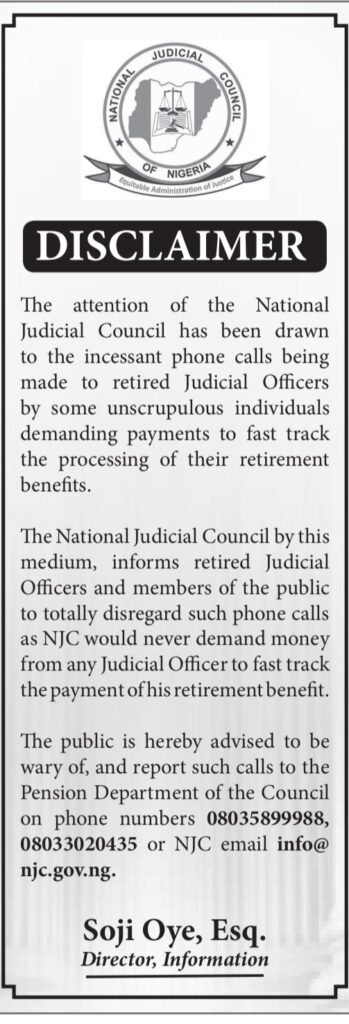By Ise-Oluwa Ige
The House of Representatives Committee on Judiciary has summoned a crucial meeting of key stakeholders on the poor remuneration of judicial officers across the country.
The meeting which holds on March 25, 2024 is expected to be attended by the Ministers of Finance, Budget and National Planning, the Secretary of National Judicial Council (NJC), the National President, Judicial Staff Union of Nigeria and the Chairman, Revenue Mobilisation Allocation and Fiscal Commission.

Others expected at the meeting are the Chairman, Nation’s Salaries, Incomes and Wages Commission, the Attorney General of the Federation and Minister of Justice as well as the President of the Nigerian Bar Association.
Bar & Bench Watch reports that a letter to the effect is dated March 18, 2014 and titled “Case for upward review of judicial remuneration”
The House committee, in the letter said it received complaints about judges salaries from the Nigerian Bar Association.
The letter signed by the committee’s Chairman, Oluwole Oke, reads: “The committee is in receipt of a submission by the NBA advocating a review of judicial officers’ remuneration and conditions of service.
“In view of the above submission, the committee wishes to invite you to a more robust interactive session with other stakeholders to review the submission and educate the committee on the current situation and plans to deal with the unrealistic salary structure of the judiciary and your position on the matter.”
Bar & Bench Watch reports that more than one and a half years ago, the National Industrial Court (NIC) had ordered the Federal Government to emplace necessary machinery for upward review of salaries and allowances of all categories of judges in the country.
That was after it held that the current remunerations of serving judicial officers in the country were not only abysmally low but also embarrassingly shameful.
Specifically, the court ordered the Federal Government to commence a monthly payment of N10 million to the Chief Justice of Nigeria (CJN), N9 million to other justices of the apex court and the President of the Court of Appeal; N8 million monthly salary to other justices of the Court of Appeal and Chief Judges of both the Federal and States High Courts; N7million to judges of the Federal and States High Courts; N8million to Heads of Sharia Court of Appeal and its counterpart in the Customary Court, and N7 million for the judges in both courts.
The court also ordered that the Federal Government should continue to carry out a yearly or once in two years review of the salaries and allowances of the judicial officers.
The court gave the orders while delivering judgment in a public interest lawsuit filed by a senior lawyer, Sebastine Hon, to compel the Federal Government to increase the salaries and allowances of judges in the country.
The trial judge in the case, Obaseki-Osaghae J. lamented that it was unfortunate that justices and judges who are ministers in the temple of Justice had become victims of great injustice in the country.
The judgment however did not indicate whether the salaries fixed for the different categories of judges were inclusive of their allowances neither did the judgment give any breakdown of how it arrived at the figures.
Bar & Bench Watch reports that judges’ salaries and allowances were last reviewed upward in 2007.
Under the Certain Political, Public and Judicial Office Holders (Salaries and Allowances, etc) (Amendment) Act, 2008, the CJN’s annual basic salary is N3,353,972.50 (or N279,497.71 monthly), while other Justices of the Supreme Court and the President of the Court of Appeal receive N2,477,110 as basic annual salary or N206,425.83 monthly each.
The Justices of the Court of Appeal, Chief Judge of the Federal High Court, Chief Judge of the Federal Capital Territory (FCT) High Court and President of the Industrial Court, Grand Khadi of State and FCT Sharia Court of Appeal, President FCT and State Customary Court of Appeal earn annual basic salary of N1, 995,430.18 each.
Also, judges of the Federal, State and FCT High Courts, National Industrial Court, Khadi Sharia Court of Appeal in the FCT and State; and FCT and State Customary Courts also earn an annual basic salary of N1,804,740.00 each.
Notwithstanding that public servants and political office holders got pay rise in 2011, the salaries of all categories of Nigerian judges have remained static since 2007.
Whereas, the average exchange rate of one USD to Nigerian Naira (NGN) in 2007 when Nigerian judges received a pay rise was $1: N117.88, the salary of judges remained static notwithstanding the fact that the exchange rate jumped insignificantly from 1$: N117.88 in 2007 to 1$: N117.98 in 2008; 1$: N158.6 in 2014; 1$: N253.5 in 2016; 1$: N305.8 in 2017; 1$: N361 in 2018; 1$: N360 in 2019; 1$: N380 in 2020; 1$: N413 in 2021; 1$: N450 in 2022; 1$: N750 in 2023 and 1$: N1,700 in 2024.
According to Hon (SAN), the implication is that the salaries of judges in Nigeria have not kept pace with inflation and when adjusted for inflation, the Chief Justice of Nigeria (CJN) and all categories of judicial officers in the country actually make much less now in 2024 than what they did between 2007 and 2023 when Naira was indeed stronger than what it is today.
Worse still, a survey of judges’ salaries in other countries of the world by showed that they not only enjoyed periodic review of their salaries, Nigerian judges’ salaries are mere fractions of what their counterparts earn across the years covered by this report.
It is so bad that a recent independent survey by the Nigerian Bar Association (NBA) showed that Ghana and South Africa are even doing much better in the way they remunerate their judges than Nigeria.
That was the reason Hon approached the National Industrial Court (NIC) in 2022 for a mandamus order compelling the central government to review upward the salaries and allowances of judges.
Indeed, a month after the court entered its verdict on the matter, a lawmaker and former leader of the Senate in the 7th Assembly, Senator Victor Ndoma-Egba, SAN, in an interview with Vanguard expressed worry over how the court order would be implemented especially when the judgment was silent on how it arrived at the figures.
According to him, salaries of public officers, including judicial officers, are guided by constitutional provisions and are as prescribed by the National Assembly but not exceeding what shall have been determined by RMAFC.
However, many lawyers including rights activist, Ebun-Olu Adegboruwa (SAN), Mr Olalekan Ojo (SAN) among others had hailed the judgment, arguing that the salary fixed by the judge for the nation’s judicial officers did not even commensurate with their efforts but that it was a good way to start.
Following the controversy that trailed the figures released by the court, the Federal Government went on appeal to challenge the NIC’s judgment.
The appeal, though still pending, former President Muhammadu Buhari, yet promised top lawyers in the country led by the immediate past Chairman of the Body of Benchers, Chief Wole Olanipekun (SAN) that he would review the judges’ pay even if it would mean starting it off with the recommendation of the Technical Committee on Judicial Remuneration (TCJR) which his government set in 2017 and submitted its recommendation in 2018.
RMFAC WRITES NBA FOR A MEMORANDUM ON NEW REMUNERATION FOR JUDGES
Indeed, by a letter dated November 2, 2022, with Reference No RMC/FEF/58/I/103, an agency of the Federal Government—Revenue Mobilisation Allocation and Fiscal Commission (RMFAC)— invited the NBA to submit a memorandum for the review of the remuneration of public, political and judicial office holders in Nigeria, a signpost that President Buhari’s government was actually serious about the pay raise for the judges.
The President of the NBA, Mr Yakubu Chonoko Maikyau (SAN) quickly set up a 12-member Working Committee on Judicial Remuneration and Conditions of Service to advise RMFAC on the befitting salaries for all categories of judges in the country.
After a wide consultation, the Mikyau-led committee submitted a 144-page memorandum to propose a 200% increase in the basic salaries of all judicial officers.
The umbrella organisation of Nigerian lawyers also proposed a total overhaul of what currently consists of judicial allowances: medical, rent, leave, hardship allowances.
Specifically, the NBA proposed 40% of the basic salary of all judicial office holders as medical allowance, 100% upward review in rent, leave and hardship allowances respectively.
Besides, the NBA proposed five new allowances for judges in recognition of the peculiar demands of the judicial offices that deserve compensation but which are not presently included in allowances available to judicial officers. These allowances include restrictive lifestyle allowance, dual responsibility allowance, disruptive burden allowance, long service allowance and legal research allowance.
The NBA proposed 100% lifestyle allowance for all judicial office holders, in recognition of the limitations on lifestyle of judicial officers imposed by the Judicial Code of Conduct; 20% Dual Responsibility allowance for all heads of court, in recognition of the peculiar burden inherent in the offices of the heads of courts; 50% Disruptive Burden Allowance for Justices of the Court of Appeal, Judges of the Federal High Court and the National Industrial Court, in view of the frequency of their transfers including to mitigate the financial burden of maintaining two homes; 10% Long Service Allowance payable monthly to judicial officers who have served on the Bench for a minimum of 5 years and 70% monthly legal research allowance for all heads of courts, justices of the Supreme Court and justices of the Court of Appeal.
The NBA also proposed delinking judicial remuneration from that of the civil service and recommended an independent new Judicial Salary Pay Scale to be known as the Judicial Service Pay Scale (JSPS), to enable judicial salaries to be subject to regular reviews that are distinct from that carried out in respect of the civil service.
The NBA memorandum and the TCJR report on the new salaries for all categories of judicial officers are with RMFAC for consideration and implementation.
Although President Muhammadu Buhari, on November 18, 2022, again reaffirmed the commitment of his administration to review upward the salaries of judicial officers in the country, he never did until he left office on May 29, 2023.
Tinubu pledges to review judges’ pay upward
No wonder, the leadership of the Nigerian Bar Association (NBA) barely allowed President Tinubu to settle down in office for two and a half months when it visited him at the Presidential Villa, Abuja to discuss the plight of the Nigerian judges with him.
Tinubu who patiently listened to the NBA on August 24, 2023, gave his assurance to transform the lives of Nigerian judges by reviewing upward their remuneration as he did in Lagos State when he was the chief executive.
But up till this moment, nothing has been heard about it which the lawmakers said was unacceptable, hence the stakeholders’ meeting.




